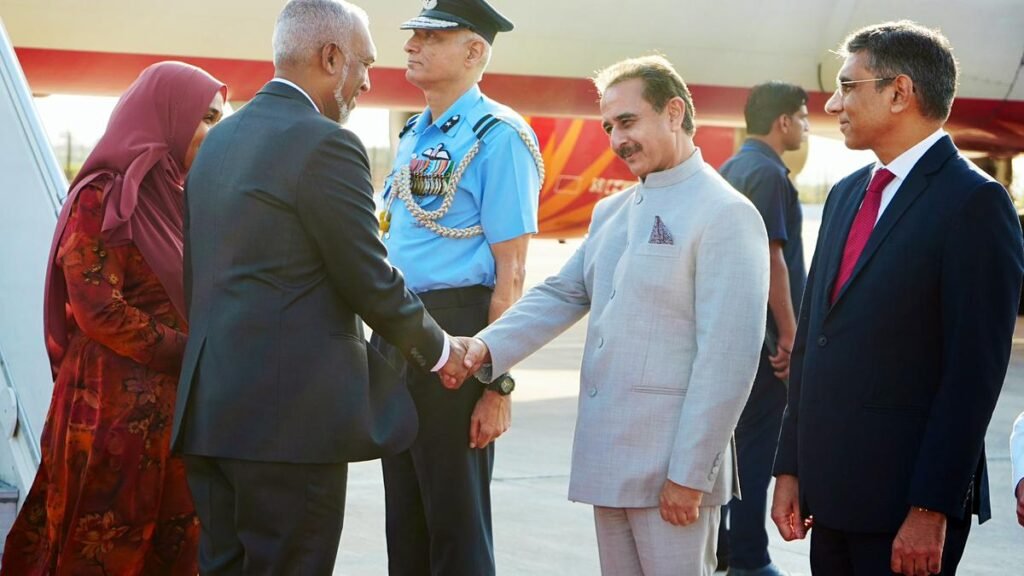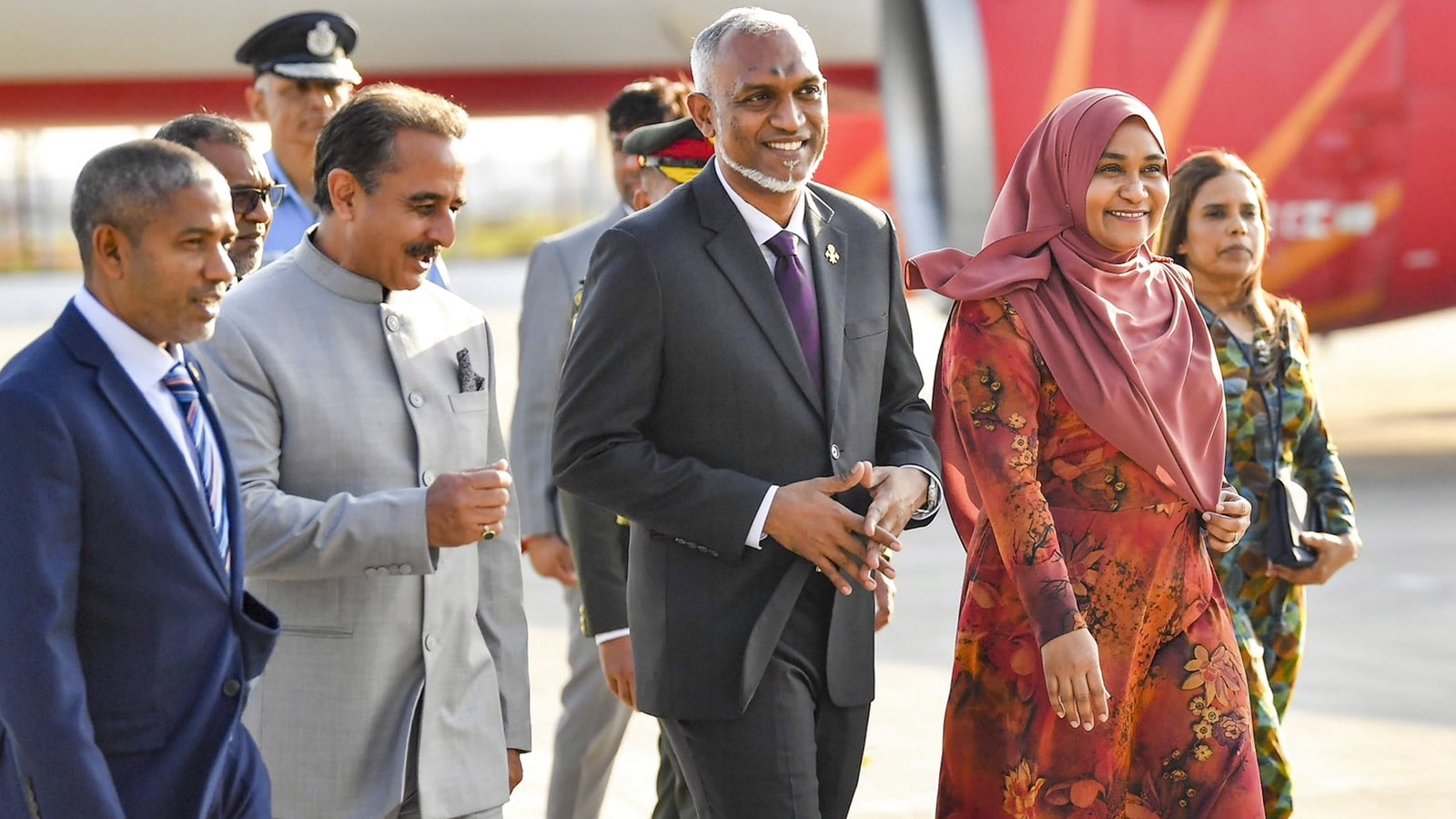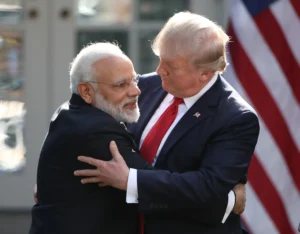
“Muizzu’s First Bilateral Visit to India: Key Discussions on Economic and Security Issues Ahead”

Maldives President Mohamed Muizzu and First Lady Sajidha Mohamed arrived in New Delhi on October 6, 2024, marking his first bilateral visit to India. This visit is significant as it aims to mend the diplomatic ties between the Maldives and India, which had soured during Muizzu’s presidency due to his previous stance on Indian military presence in the Maldives.
Arrival and Reception
President Muizzu landed at the Air Force Station Palam around 4:30 PM, where he was welcomed by Kiriti Vardhan Singh, Union Minister of State for External Affairs. This visit is scheduled to last until October 10, during which Muizzu will engage in discussions with Indian President Droupadi Murmu and Prime Minister Narendra Modi, focusing on various bilateral, regional, and international issues of mutual interest.
Objectives of the Visit
The primary aim of President Muizzu’s visit is to repair and strengthen the previously strained relations with India. His administration has shifted from a confrontational stance—exemplified by the “India Out” campaign during his election campaign—to a more reconciliatory approach. This change reflects a recognition of India’s importance as a key partner for economic support amid the Maldives’ current financial challenges.
Key Discussion Points
- Economic Support: Muizzu is expected to discuss potential financial aid from India to help address the Maldives’ balance of payments crisis. With foreign reserves dwindling to approximately $440 million, the Maldives faces significant economic pressures
- Infrastructure Cooperation: India has invested nearly $1.5 billion in various infrastructure projects in the Maldives. The two nations are likely to finalize agreements that enhance this cooperation further
- Military Presence: While Muizzu previously called for the withdrawal of Indian troops, he has moderated his rhetoric, indicating a willingness to engage in dialogue about military presence without compromising sovereignty
Background Context
This visit comes after a series of diplomatic tensions following Muizzu’s election in 2023. His government initially sought closer ties with China and Turkey over India, marking a departure from traditional diplomatic norms where Maldivian presidents typically visited India first. However, recent comments from Muizzu suggest a desire to stabilize relations with India, recognizing it as one of the Maldives’ closest allies
Future Engagements
During his stay, Muizzu will also travel to Mumbai and Bengaluru for business events and interact with the Maldivian diaspora. This engagement underscores India’s strategic importance in the Indian Ocean region and its efforts to maintain strong ties with its neighbors amidst growing Chinese influence.In summary, President Muizzu’s visit represents a critical opportunity for both nations to reaffirm their commitment to collaboration and address pressing economic challenges while navigating complex geopolitical dynamics in South Asia.
What are the key issues Muizzu plans to discuss with Indian leaders

Maldives President Mohamed Muizzu’s visit to India from October 6 to 10, 2024, is pivotal for addressing several key issues aimed at mending and strengthening bilateral relations. Here are the primary topics he plans to discuss with Indian leaders:
Key Issues for Discussion
- Bilateral Cooperation: The overarching theme of Muizzu’s agenda is to enhance bilateral collaboration between the Maldives and India. This includes discussions on economic cooperation and investment opportunities, particularly in light of the Maldives’ current economic challenges, such as declining foreign reserves and a recent credit rating downgrade
- Military Presence: One of the contentious points in recent years has been the presence of Indian military personnel in the Maldives. Muizzu’s administration previously called for their withdrawal, framing it as a matter of national sovereignty. However, recent statements indicate a willingness to engage in dialogue about this issue without compromising regional stability or inviting Chinese military presence
- Economic Support: Given the Maldives’ economic turmoil, discussions will likely focus on financial assistance from India. This includes potential aid packages and investments aimed at stabilizing the Maldivian economy, which heavily relies on tourism
- Infrastructure Projects: India has invested significantly in infrastructure initiatives within the Maldives. Muizzu is expected to discuss ongoing projects and potential future collaborations to bolster this aspect of their partnership
- Regional Security: The geopolitical landscape in the Indian Ocean, particularly concerning China’s growing influence, will be another critical topic. Both nations are likely to address maritime security issues and how they can work together to ensure stability in the region
- People-to-People Ties: Enhancing cultural and social connections between the two nations is also on the agenda. This includes fostering deeper people-to-people ties through educational exchanges and tourism initiatives
- Business Engagements: Muizzu will engage with business communities during his stops in Mumbai and Bengaluru, emphasizing trade relations and investment opportunities that could benefit both countries
Overall, Muizzu’s visit represents a significant step towards recalibrating Maldives-India relations, moving from previous tensions toward a more collaborative future.
How has the relationship between India and the Maldives evolved over the years

Early Diplomatic Ties (1965-1978)
- Independence and Recognition: India was among the first countries to recognize the Maldives after its independence from British rule in 1965, establishing diplomatic relations shortly thereafter.
- Foundational Agreements: The signing of the Maritime Boundary Agreement in 1979 marked a key moment in defining maritime boundaries, laying the groundwork for future cooperation.
Strategic Partnership (1978-1988)
- Military Cooperation: The relationship deepened with India’s military intervention during the coup attempt in 1988 (Operation Cactus), aimed at stabilizing the Maldivian government. This intervention, while initially controversial, helped reinforce India’s role as a key ally.
Political Turbulence (1988-2008)
- Strained Relations: The next two decades saw fluctuations in relations due to domestic political changes in the Maldives. Concerns over democratic governance and human rights issues arose, particularly during the presidency of Maumoon Abdul Gayoom.
Normalization and Economic Cooperation (2008-2013)
- Political Transition: The election of Mohamed Nasheed in 2008 ushered in a period of improved relations. India increased its developmental assistance, focusing on infrastructure projects and economic cooperation.
- Cultural Ties: Enhanced people-to-people connections were emphasized, fostering goodwill between the two nations.
Period of Strain (2013-2018)
- Shift Towards China: Under President Abdulla Yameen, relations soured as the Maldives tilted towards China, engaging in significant infrastructure projects under China’s Belt and Road Initiative. This shift raised strategic concerns for India.
- “India Out” Campaign: Rising anti-Indian sentiment culminated in the “India Out” campaign, which branded Indian military presence as a threat to sovereignty.
Renewed Engagement (2018 Onward)
- Election of Ibrahim Mohamed Solih: The election of Solih marked a turning point, with efforts to restore ties with India. His administration has sought to re-engage diplomatically and economically.
- Recent Developments: Despite recent tensions stemming from derogatory remarks by Maldivian ministers about Indian leadership, both countries continue to explore avenues for cooperation. Muizzu’s current visit aims to further solidify these ties amidst ongoing geopolitical complexities.
Current Dynamics
- Strategic Importance: The Maldives holds significant strategic value for India in the Indian Ocean region, acting as a counterbalance to China’s influence.
- Economic Collaborations: Discussions around economic support, infrastructure development, and security cooperation are central to ongoing dialogues between the two nations.
The evolution of India-Maldives relations reflects a complex interplay of geopolitical interests, domestic politics, and shared cultural ties. As both nations navigate their partnership amid changing global dynamics, mutual respect and cooperation remain crucial for their future interactions.

Conclusion
The relationship between India and the Maldives has traversed a dynamic landscape marked by cooperation, tension, and strategic recalibration. From the early days of diplomatic recognition to the complexities of recent years, both nations have navigated challenges arising from domestic politics and shifting geopolitical influences.As President Mohamed Muizzu embarks on his first bilateral visit to India, there is a renewed opportunity to mend ties and foster collaboration. The discussions surrounding economic support, military presence, infrastructure projects, and regional security are not just pivotal for bilateral relations but also for stability in the Indian Ocean region.Moving forward, it is essential for both countries to prioritize open dialogue and mutual respect to strengthen their partnership. By embracing shared interests and addressing concerns collaboratively, India and the Maldives can build a resilient relationship that benefits both nations and contributes positively to regional dynamics. As they embark on this journey together, the potential for growth and cooperation remains significant, paving the way for a brighter future in their diplomatic ties.
Discover more from
Subscribe to get the latest posts sent to your email.







